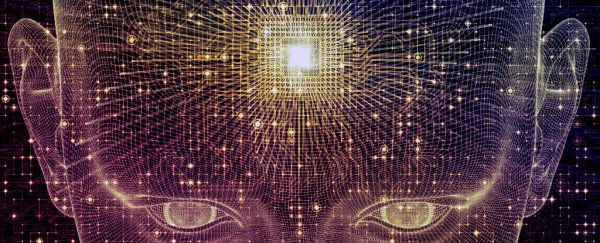Scientists say it's possible to build a new type of self-replicating computer that replaces silicon chips with processors made from DNA molecules, and it would be faster than any other form of computer ever proposed - even quantum computers.
Called a nondeterministic universal Turing machine (NUTM), it's predicted that the technology could execute all possible algorithms at once by taking advantage of DNA's ability to replicate almost perfect copies of itself over billions of years.
The basic idea is that our current electronic computers are based on a finite number of silicon chips, and we're fast approaching the limit for how many we can actually fit in our machines.
To address this limitation, researchers are currently working on making quantum computers a reality - super-powerful devices that replace the bits of electronic computers with quantum-entangled particles called qubits.
Unlike regular bits that can only take on the form of 1 or 0 in the binary code, qubits can take the form of 0, 1, or a superposition of the two simultaneously, which allows them to perform many different calculations at once.
Obviously this would result in a huge boost in speed, but quantum computers are an incredibly difficult thing to get right, because of how complicated it is to create the exact conditions for not one quantum-entangled particle, but a whole lot of them.
Despite concerted efforts all over the world, no one has managed to build a fully functioning quantum computer.
But the secret third option here is a DNA-based machine that gets all the benefits of a quantum computer, without the headache of quantum weirdness, because it's based on DNA doing what DNA does best - replicating.
"DNA is an excellent medium for information processing and storage," the team from the University of Manchester in the UK explains.
"It is very stable, as the sequencing of ancient DNA demonstrates. It can also reliably be copied, and many genes have remained virtually unchanged for billions of years."
To give you an idea of the difference such a device could make in the world, imagine you've got a computer program searching a maze, and it reaches a fork in the road.
A regular electronic computer would have to decide which path to follow, but a DNA-based computer wouldn't need to choose - it could replicate itself and follow both paths at the same time.
With both paths covered, the program would figure out which one leads to the end of the maze far quicker than an electronic computer that could only test one at a time.
"Our computer's ability to grow as it computes makes it faster than any other form of computer, and enables the solution of many computational problems previously considered impossible," says one of the team, Ross D. King.
"Quantum computers are an exciting other form of computer, and they can also follow both paths in a maze, but only if the maze has certain symmetries, which greatly limits their use."
Not only that, but imagine no longer being constrained by the physical limits of using silicon chips, which are pretty damn small right now, but are nowhere near the size of a single DNA molecule.
"As DNA molecules are very small, a desktop computer could potentially utilise more processors than all the electronic computers in the world combined - and therefore outperform the world's current fastest supercomputer, while consuming a tiny fraction of its energy," says King.
While DNA-based computers have been proposed since the 1990s, King and his team say this is the first time the feasibility of a DNA-based nondeterministic universal Turing machine (NUTM) has been established.
"We demonstrate that this design works using both computational modelling and in vitro molecular biology experimentation," the team reports.
"The current design has limitations, such as restricted error-correction. However, it opens up the prospect of engineering NUTM-based computers able to outperform all standard computers on important practical problems."
The researchers propose using DNA molecules to represent information based on the four-character genetic alphabet - A [adenine], G [guanine], C [cytosine], and T [thymine] - rather than the binary alphabet of 1s and 0s.
They say that regular computers - which are classified as universal Turing machines (UTM) - can be converted into nondeterministic universal Turing machines (NUTM) using a programming language called Thue.
Invented by software engineer John Colagioia in early 2000, Thue programming language can take strings of alphabet symbols and rewrite them in different orders to create completely separate strings for a self-replicating form of data processing.
"The application of a Thue rule to a string therefore produces a new string - equivalent to change of state in a UTM," the researchers explain.
Because multiple Thue rules can be applied to a single string, and individual Thue rules can be applied to multiple positions in a string, the computing possibilities are virtually endless.
The team has also demonstrated that DNA is physically strong enough to act as processors in this set-up - something that previous experiments have also shown - and say it's now up to someone to actually build this thing for real.
That's probably many years off yet, but if the researchers are correct in their assumptions, we've just been given a roadmap to the sickest, strangest, and most intimidating computer system ever.
I hope we're ready for it.
The research has been published in the Journal of the Royal Society Interface, and you can read it for free at arXiv.org.
